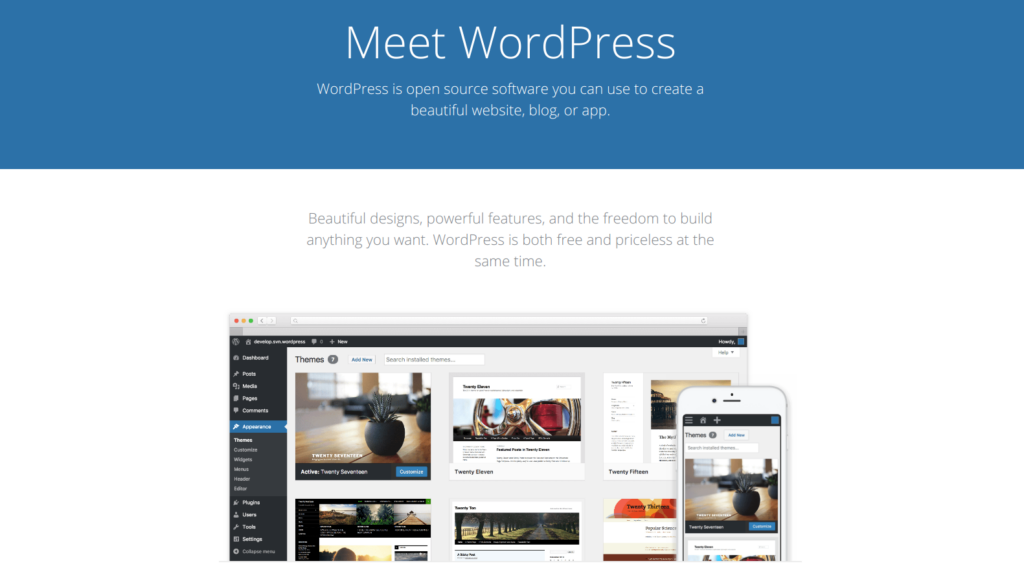Blogging might be a way you express yourself, your interests, hobbies, beliefs, etc. Furthermore, you can make a living from it. Whatever the reason, you want your blog to be built on a platform that comes with lots of advantages, provides many possibilities, and suits all your needs. Considering the fact that there is a vast amount of CMS platforms, it is really tough to make the decision. That is why I would like to help you in this by providing you with valuable information on the best CMS platforms for blogging.
List of the best CMS platforms for blogging in 2021
In 2021 many blogging platforms have been created for bloggers with customized settings and different capabilities. We have chosen the most popular and affordable platforms that will satisfy the needs of all audiences. If you are a beginner or professional writer or artist – you’ll find the ideal platform for your blog. Let’s take a look at each one of them.
WordPress
-
-
WordPress.org
-
Due to the fact that WordPress is one of the most widely used content management systems, it would be weird not to include it in this list. WP is considered to be a standard for a website which comes with unlimited functionality and is enjoyable to work with. Although WordPress requires a moderate learning curve, it is still extremely flexible towards newbies as well as professionals. The WP users can extend the functionality of their websites and make them unique with the help of thousands of themes and plugins. To start a blog on WordPress, you will need to register a domain name and choose web hosting. After that, you will have a site at your disposal for customizing it, add content, etc.
Pros:
- complete control over your site
- access to more than 55,000 free plugins
- different awesome features every blogger would love: online store, paid membership, forum
- SEO plugins and tools, which helps a lot
- large community, which provides great support
Cons:
- complete control means learning a lot of things
- your security is your responsibility
-
-
WordPress.com
-
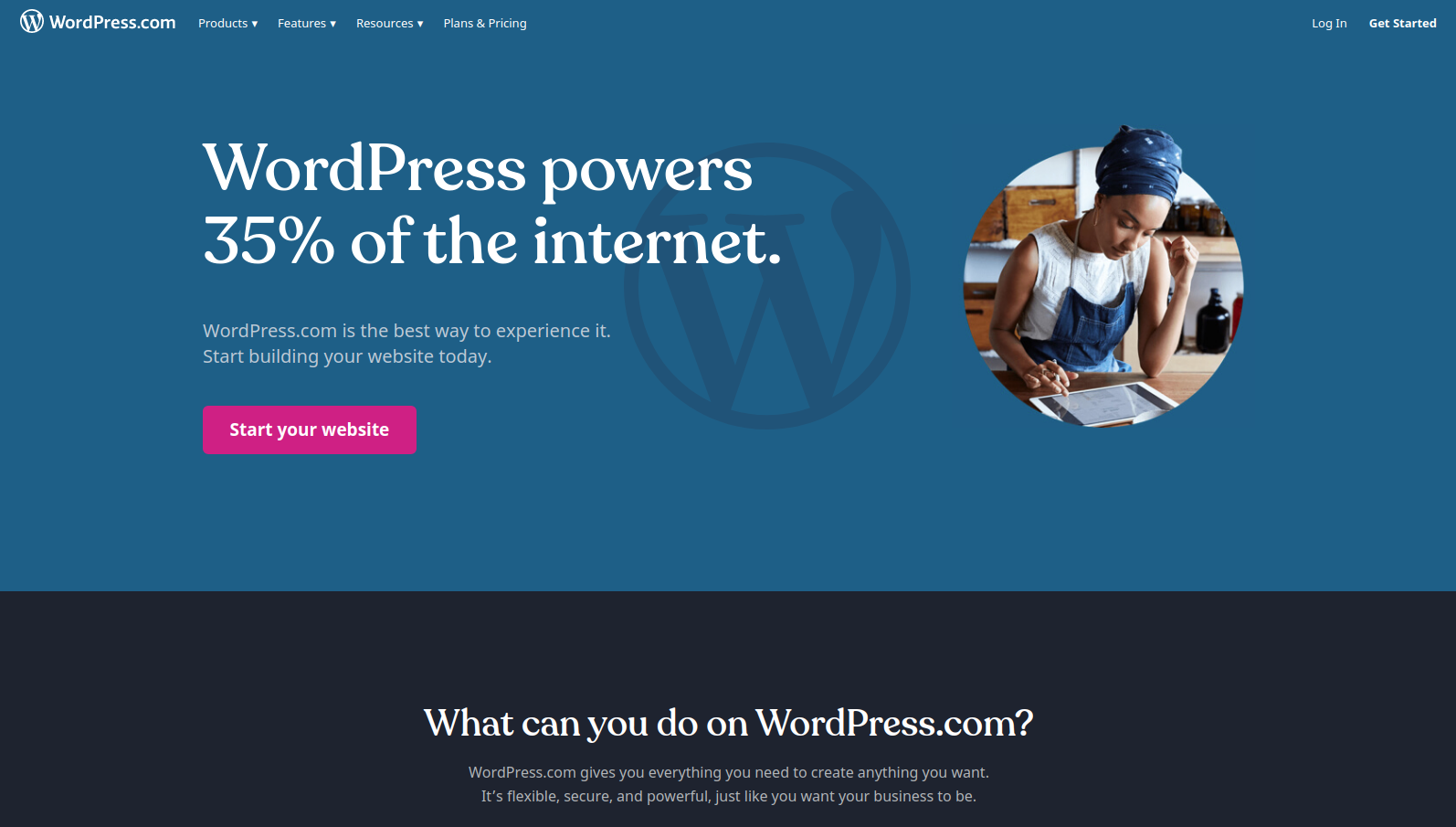
WordPress.com is a hosted version of WordPress which means that all you have to do to start blogging is to create an account. Here you can publish your posts right away. Running a blog on this platform is free of charge, but in case there is the need for advanced features and options, you can choose one of the paid plans. It is a highly customizable CMS that keeps things simple and clear. There are many themes to choose from as well as plugins. WordPress.com is the best solution for those who care only about blogging and want a mix of power, customization, and usability. WP is the most popular blogging platform for developers – there are more than 100 plugins and solutions for individual preference for blogs.
Pros:
- Beginner-friendly, it’s easy to use
- Completely free, as long as you are okay with the WordPress.com subdomain and don’t need advanced features
- Hosting is included
- Dedicated support
Cons:
- The free plan is very limited
- Luck of customizability – no custom themes and plugins
- WP.com will run their ads on your free site, and won’t let you show advertisements
- You don’t even own your blog and can lose it in case WP.com find any service terms violations
Blogger

Blogger is a Google-owned service and one of the very first blogging platforms. This CMS is also known for its immediate setup and user-friendly interface – it could be the best blogging platform for beginners if they don’t have a sufficient level of proficiency in HTML. Running a blog site on Blogger is completely free, with the default subdomain yourblog.blogspot.com. Blogger is the WYSIWYG (what you see is what you get) platform, which means it is impossible to perform any code related customizations to your site. Thus, Blogger CMS is the best spot to start a blog for those who appreciate simplicity more than functionality.
Pros:
- It’s free
- Carries of hosting and maintenance
- You don’t need any coding skills to run a blog using this CMS
- Additional Google’s robust security
- Possibility to integrate with Google Drive and other products
- Anti-spam comments feature
Cons:
- Limited tools – you are able to add new features only after growing in popularity
- This CMS does not frequently get updates
- A few templates are available; the design option is limited
- You are not able to integrate with other apps or services
- Ads will be shown on your blog
Tumblr

Tumblr is informally known for its “micro-blogging” concept. It is an awesome free blogging platform designed for those who prefer to publish short-form content (mostly visual: images, videos, infographics, quotes, animated GIFs, etc.) This blogging platform comes with an inbuilt sharing option, which means there is no need to share the content manually. Tumblr is a perfect place for bloggers who want to start publishing their posts right away. It is also a great place for those who don’t want to turn their blog into a business project and also who don’t mind limited customization options. But once you decide to move your blog from Tumblr to WordPress, or another platform, you can do it automatically with aisite.
Pros:
- Tumblr is free with its subdomain
- Easy to use, hosting is included
- Integrated re-blogging and sharing social features
Cons:
- Many beautiful themes are available, but they don’t offer additional features
- Featured are limited and can’t be extended with blogs growing
- Backing up is possible, but not that easy
Squarespace
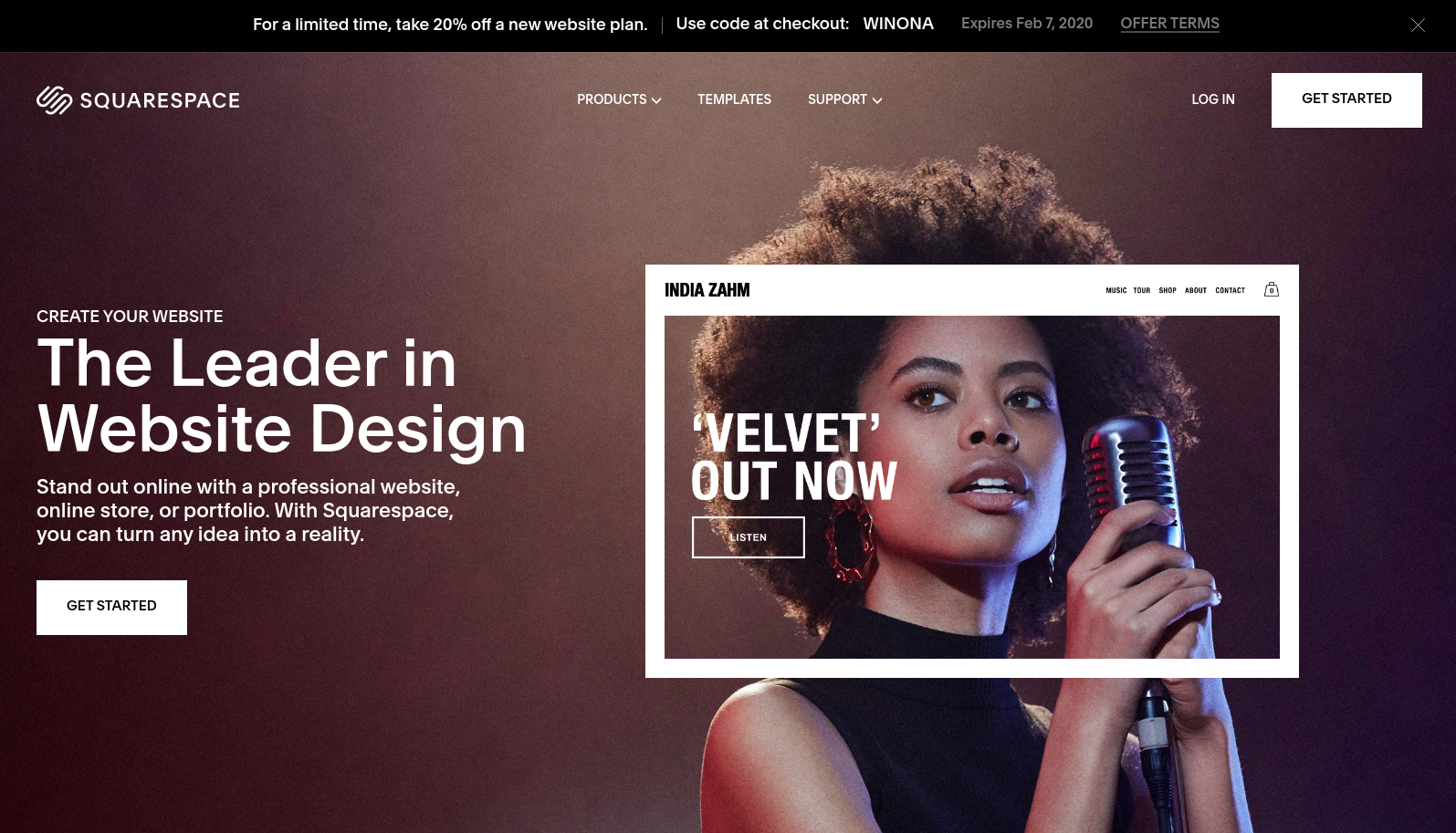
Squarespace website builder comes with a user-friendly interface, WYSIWYG editor, and great built-in features needed to create a website. Although this content management system is not open source, it provides its users with the possibility to make some modifications in HTML/CSS and Java code. Thus, Squarespace is the best cms blog for those who are not code-gurus but want to build a good-looking and secure site for personal or business usage.
Pros:
- Custom domain and hosting is included
- Easy to use, even for beginners
- Built-in SSL encryption
- E-commerce tools
Cons:
- You can use only the platform’s features
- A few integrations are available
- A limited number of pages and contributors using a personal plan
Gator by HostGator
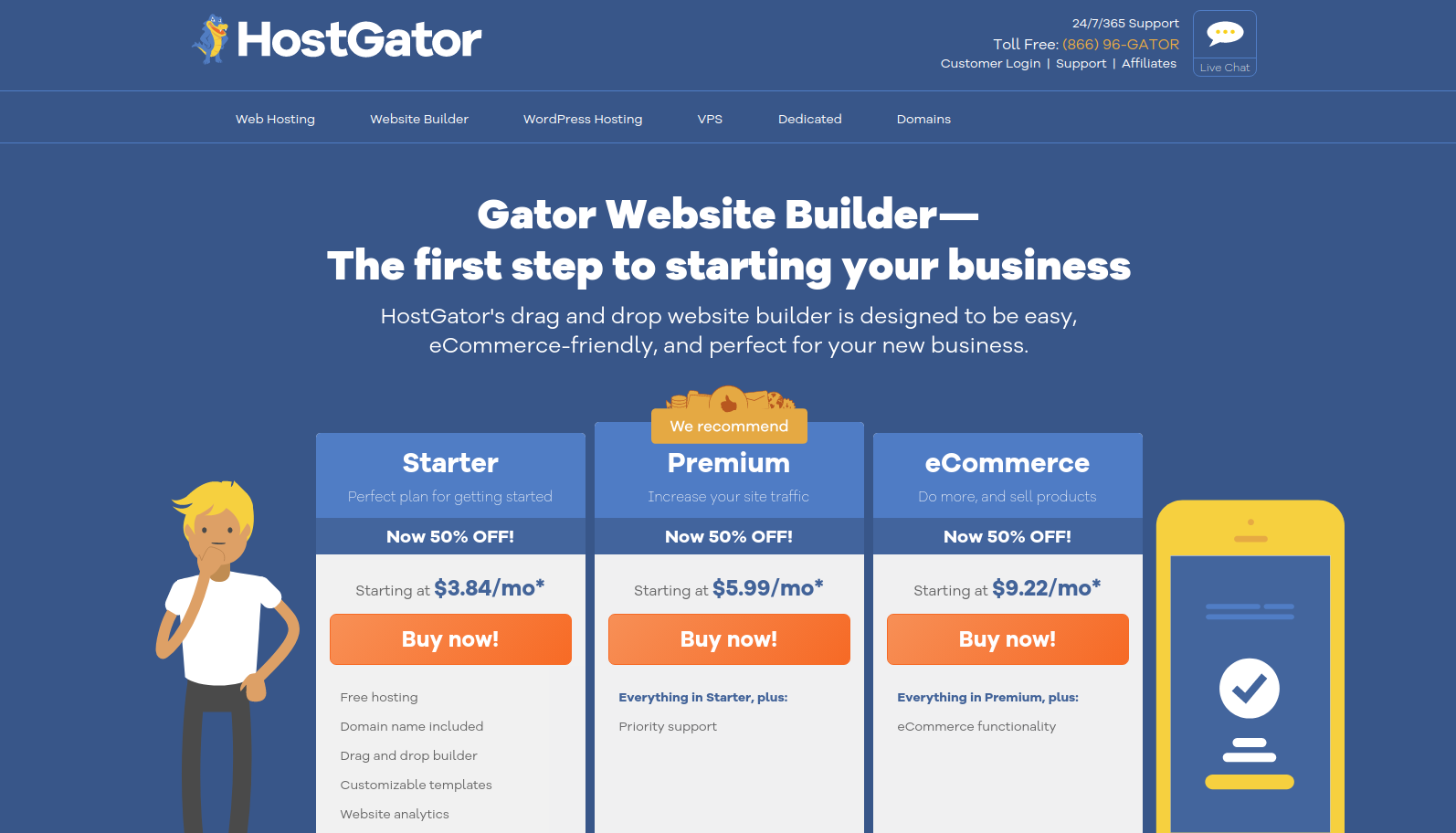
Gator is a blogging platform and website builder, which offers a drag&drop tool. Using this one you can create different types of a website: blog, business website, online store. It is created by HostGator, which can be used to start a WordPress blog too. But, in case WordPress is not the CMS you want to run a website with, Gator could be a great solution for you!
Pros:
- The easy and quick setup even for non-techie users
- The free domain name and SSL certificate
- Security and backups handled by HostGator
Cons:
- E-commerce functionality available only with a higher-priced plan
- Limited extensions and apps
- No free account
MovableType
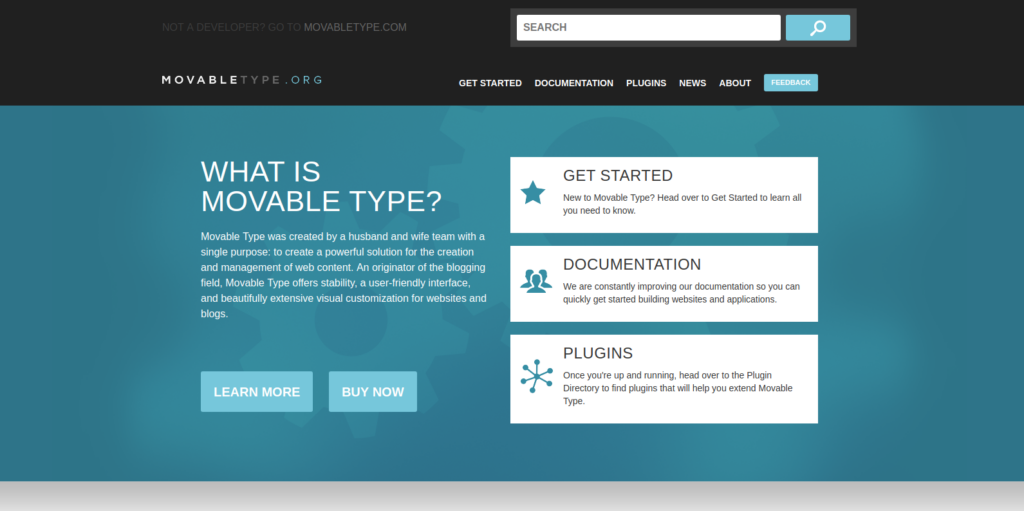
MovableType is one of the first blogging content management systems which comes with its loyal user base and powerful feature set. This platform possesses all the required qualities to create not only a blog but also any other type of website. The distinctive feature of this platform is that it is paid, self-hosted CMS. It is rather simple to install and run a blog on MovableType. The users are also enabled to make some customizations to their site. The drawback of this platform is that it has a relatively small community for support. Thus, MovableType is the best blogging CMS for those who want to house a major blogging project.
Pros:
- Easy to use control panel
- Responsive support system
- Сonvenient to use by a team
Cons:
- A small number of plugins, compared to more popular CMSs
- Not that media-friendly
- The backend customization is complicated
Ghost
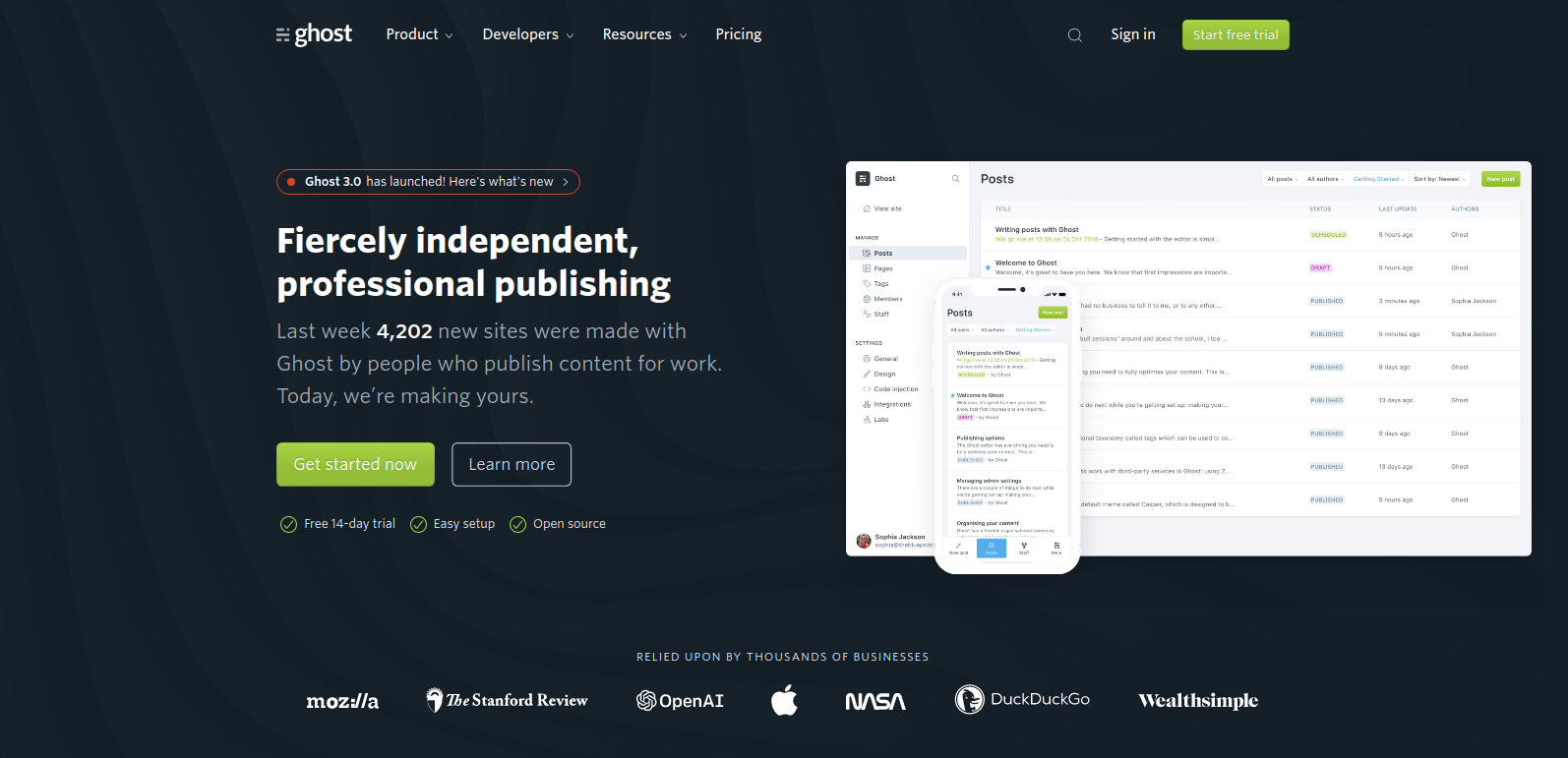
Being a relatively new CMS platform, Ghost is constantly growing its popularity and is already popular enough to be on this list. This platform is designed specifically for bloggers, and all their needs and demands are taken into consideration. Ghost has a user-friendly interface. It provides bloggers with diverse widgets that show stats in a very stylish way. It is also possible to choose between self-hosted Ghost and cloud-hosted solution Ghost Pro. Ghost is one of the most popular blogging platforms for artists – it great for small blogs and for bloggers who appreciate simplicity and awesomeness. Artists can realize their ideas in individual design variations and the ability to make global blog changes on their own.
Pros:
- Social media and SEO capabilities are built-in
- The emphasis on blogging
- Streamlined and intuitive interface
Cons:
- Hosting isn’t included, and the self-hosted version is difficult to set up
- Limited configuration options and themes
- Customizing is not that easy
Wix

Wix is designed to develop distinctive types of websites, but it also can be used as a starting point for blogging. This platform comes with plenty of advantages for a beginner, such as intuitive interface, drag-and-drop building option, and excellent designs. Along with the pros, there are some cons. Once you’ve chosen a template, there is no way to change it later. And it has many negatives from an SEO perspective. Wix is the best CMS for blogging for those who don’t have any designing or coding skills but want to manage a blog effectively. It is also great for bloggers who don’t want to be limited just only by a blog option but to expand it to any other type of website. Also, you can compare Wix vs Squarespace vs WordPress checking the article.
Pros:
- Easy-to-use interface
- Hosting included
- A lot of beautiful design options
Cons:
- Free account means very limited capabilities
- A limited number of free apps and E-commerce functionality
- You can’t change a template once it’s chosen without losing all the data
- Add-on charges can rack up quickly
Have you found a CMS that meets your requirements better than the current one? In case you want to migrate your website to a WordPress CMS you are able to order Design customization too! Check out the information about Design service in this video:
Bottom Line
All these platforms for blogging are very popular and possess unique options to start a great blog. However, a lot of people consider that WordPress CMS is the best platform for blogging. There are many reasons why the lion’s share of bloggers opts WordPress platform. Mostly because WP CMS provides its users with a fascinating mixture of ease of use, design, expanded flexibility, and power. Wix is also very popular, but a lot of people are deciding to migrate from Wix to a better CMS.
Personally, my pick for the best blog site goes to the self-hosted WordPress blog. In case you have a thought to move your website to another CMS – Start Free Demo Migration to observe the future look of your refreshed blog on a new CMS.


